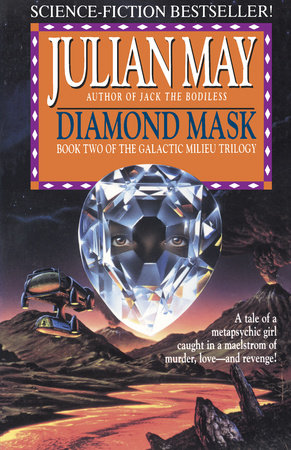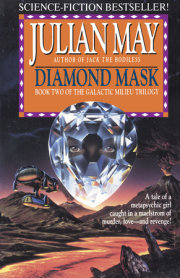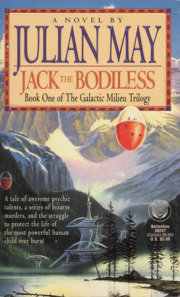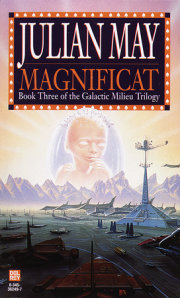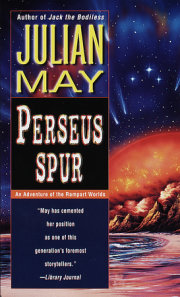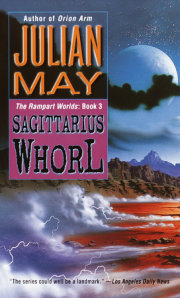PROLOGUE
KAUAI, HAWAII, EARTH
12 AUGUST 2113
HE KNEW IT HAD TO BE SOME KIND OF MIRACLE—PERHAPS ONE PROGRAMMED by Saint Jack the Bodiless himself. The misty rain of the Alakai Swamp ceased, the gray sky that had persisted all day broke open suddenly and flaunted glorious expanses of blue, a huge rainbow haloed Mount Waialeale over to the east … and a bird began to sing.
Batège! That bird—could it be the one? After four futile days?
The tall, skinny old man dropped to his knees in the muck, slipped out of his backpack straps, and let the pack fall into the tussocks of dripping grass. Muttering in the Canuck patois of northern New England, he pulled his little audiospectrograph from its waterproof pouch with fingers that trembled from excitement and hit the RECORD pad. The hidden songster warbled on. The old man pressed SEEK. The device’s computer compared the recorded birdsong with that of 42,429 avian species (Indigenous Terrestrial, Indigenous Exotic, Introduced, Retroevolved, and Bioengineered) stored in its data files. The MATCH light blinked on and the instrument’s tiny display read:
O’O-A’A (MOHO BRACCATUS). ONLY ON ISL OF KAUAI, EARTH. IT. VS.
The man said to himself: Damn right you’re Very Scarce. Even rarer than the satanic nightjar or the miniature tit-babbler! But I gotcha at last, p’tit merdeux, toi.
The song cut off and a discordant keet-keet rang out. Something black with flashes of chrome yellow erupted from the moss-hung shrubs on the left side of the trail, flew toward a clump of stunted lehua makanoe trees twenty meters away, and disappeared.
The old man choked back a penitent groan. Quel bondieu d’imbécile—he’d frightened it with some inadvertent telepathic gaucherie! And now it was gone, and his feeble metapsychic seekersense was incapable of locating its faint life-aura in broad daylight. Everything now depended upon the camera.
Taking care to project only the most soothing and amiable vibes, he hastily stowed away the Sonagram machine, uncased a digital image recorder with a thermal targeter attached, and began anxiously scanning the trees. Wisps of vapor streamed up, drawn by the tropical sun. The sweet anise scent of mokihana berries mingled with that of rotting vegetation. The Alakai Swamp of Kauai in the Hawaiian Islands was an eerie place, the wettest spot on Earth, a plateau over 1200 meters high where the annual rainfall often exceeded 15 meters. The swamp was also home to some of Earth’s rarest birds, and it attracted hardy human students of avifauna from all over the Galactic Milieu.
The old man, whose name was Rogatien Remillard, knew the island well, having first come to it back in 2052, when his great-grandnephew Jack, whom he called Ti-Jean, was newborn with a body that seemed perfectly normal. Jack’s mother Teresa, rest her poor soul, had needed a sunny place to recuperate after hiding out in the snowbound Megapod Reserve of British Columbia, and the island afforded a perfect refuge for the three of them.
Rogi had returned to Kauai many times since then, most recently four days earlier, for reasons that had seemed compelling at the time.
Well, perhaps he’d imbibed just a tad too much Wild Turkey as he celebrated the completion of another section of his memoirs …
Crafty in his cups, he had decided to get out of town before his Lylmik nemesis could catch up with him and force him to continue the work. He’d done a damned good job so far, if he did say so himself—and he might as well, since only God knew when any other natural human being would ever get to read what he’d written.
Even though he was drunk as a skunk, Rogi had wit enough to toss a few clothes and things into his egg, climb in, and program the navigator for automatic Vee-route flight from New Hampshire to Kauai. Then he had passed out. When he awoke he found his aircraft in a holding pattern above the island. He was hungover but lucid, with no idea why his unconscious mind had chosen this particular destination. But not to worry! His old hobby of ornithology, neglected for more than a decade, kicked in with a brilliant notion. He could backpack into the Alakai Swamp, where he might possibly see and photograph the single remaining indigenous Hawaiian bird species he had never set eyes upon. He landed the rhocraft at Koke’e Lodge, rented the necessary equipment, and set out.
And now, had he found the friggerty critter only to lose it through gross stupidity? Had he scared it off into the trackless wilderness of the swamp, where he didn’t dare follow for fear of getting lost? He was a piss-poor metapsychic operant at best, totally lacking in the ultrasensory pathfinding skills of the more powerful heads, and the Alakai was a remote and lonely place. It would be humiliating to get trapped armpit-deep in some muck-hole and have to call the lodge to send in a rescuer. Still, if he was careful to go only a few steps off the trail, he might still snag the prize.
He skirted a pool bordered with brown, white, and orange lichens, then peered through the camera eyepiece from a fresh vantage point. The luminous bull’s-eye of the thermal detector shone wanly green in futility. Despair began to cloud his previous mood of elation. The very last bird on his Hawaiian Audubon Checklist, forfeit because he’d failed to control his doddering mindpowers—
No! Dieu du ciel, there it was! He’d moved just enough so that the infrared targeter, preset to the parameters of the prey, could zero in on it as it sat mostly concealed behind the trunk of a diminutive tree. The bull’s-eye blinked triumphant scarlet. The old man cut out the targeter, cautiously shifted position once more, and the bird was clearly revealed in the camera’s view-finder: a chunky black creature 20 cents long, seeming to stare fiercely at him from its perch on the scraggly lehua tree. Tufts of brilliant yellow feathers adorned its upper legs like gaudy knickers peeping out from beneath an otherwise somber avian outfit. The bird flicked its pointed tail as if annoyed at having been disturbed and the old man experienced a rush of pure joy.
It was the rarest of all nonretroevolved Hawaiian birds, with a name that tripped ludicrously from the tongues of Standard English speakers: the elusive o’o-a’a!
Nearly beside himself, the old birdwatcher used the imager zoom control, composed his shot, and pressed the video activator. Before he could take a second picture the o’o-a’a repeated its double-noted alarm call almost derisively, spread its wings, and flew off in the direction of Mount Waialeale.
The rainbow had faded as a new batch of dark clouds rolled in from the east. In another fifteen minutes or so the sun would set behind the twisted dwarf forest and the Hawaiian night would slam down with its usual abruptness. He had barely found the bird in time.
He touched the PRINT pad of the camera. A few seconds later, a durofilm photo with exquisite color detail slipped out of the instrument into his hand. He stared at the precious picture, now curiously dispassionate, and heaved a sigh as he unzipped his rain jacket and tucked the trophy into the breast pocket of his shirt.
A voice spoke to him from out of the steamy air: What’s this, Uncle Rogi? In a melancholy mood after your great triumph?
Rogatien Remillard looked up in surprise, then growled a halfhearted Franco-American epithet. “Merde de merde … so you couldn’t let me celebrate my hundred-and-sixty-eighth birthday in peace, eh, Ghost?”
The voice was gently chiding: You have done so—and received a fine present besides.
“You didn’t!” the old man exclaimed indignantly. “You didn’t chivvy that poor little bird here on purpose, just so I’d find it—”
Certainly not. What do you take me for?
“Hah! I take you for an exotic bully, mon cher fantôme, that’s what. Not even a week since I turned off the transcriber, and here you are breathing down my neck. Go ahead: deny that you came to nag me to get on with my memoirs.”
I don’t deny it, Uncle Rogi. And I realize that the work is hard for you. But it’s necessary that you resume writing the family chronicle without delay. It must be completed before this year is out.
“Why the tearing hurry? Does your goddam Lylmik crystal ball foresee that I’m gonna kick the bucket come New Year’s Eve? Is that why you keep the pressure on? I’ve had a sneaking suspicion about that ever since I finished the Intervention section. You and your almighty schemes! What’s the plan? You squeeze my poor old failing brain like a sponge, then toss me on the discard heap once you get what you want?”
Nonsense. How many times must I tell you? You are immune to the normal processes of human aging and degenerative disease. You have the self-rejuvenating gene complex, just as all the other Remillards do.
“Except Ti-Jean!” Rogi snapped. “Anyway … I could always be destined to die in some accident that you and your gang of galactic snoops in Orb prolepticate, and that’s why the mad rush.”
The sky was completely overcast again and the tussocks of sedge and makaloa grass rippled in the rising wind. More rain was imminent. Turning his back upon the region from which the disembodied voice came, Rogi went squishing through the mire to retrieve his abandoned backpack. He hauled it up, mud-splattered and dripping.
Copyright © 2011 by Julian May. All rights reserved. No part of this excerpt may be reproduced or reprinted without permission in writing from the publisher.

